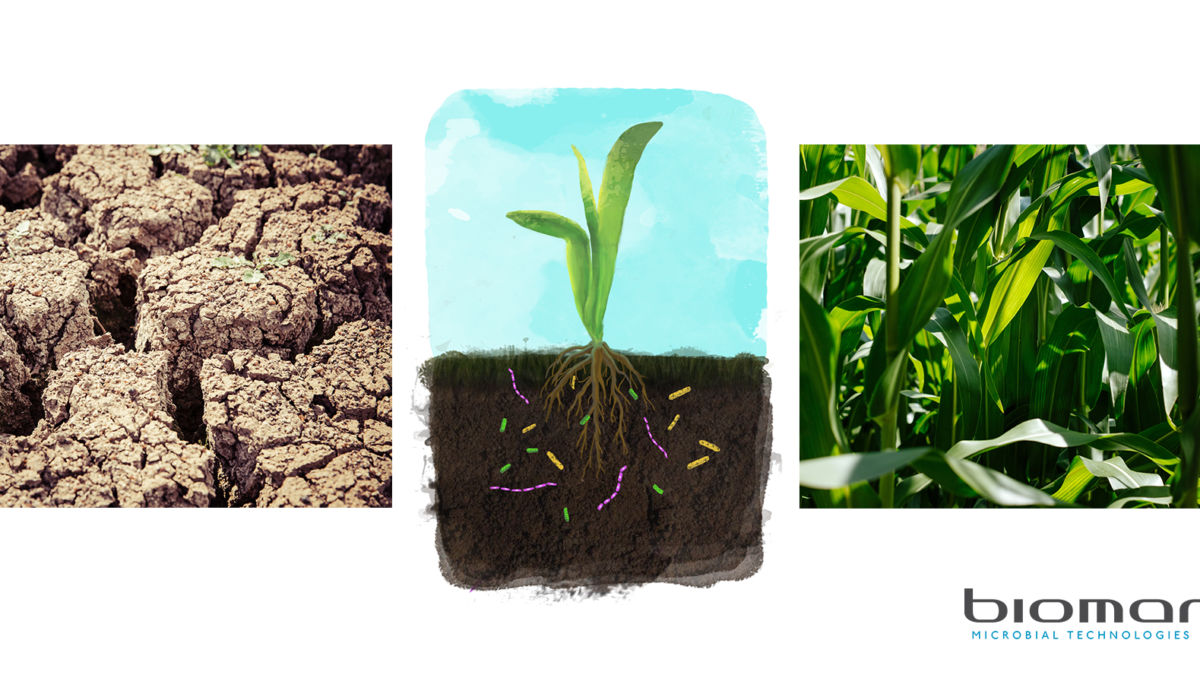MICROORGANISMS FOR A MORE SUSTAINABLE AGRICULTURE
Alleviation of the effects of drought on plants
Microorganisms are essential for the development of plants. Crops yields are often limited by the availability of soil nutrients. The interphase between the roots of the plants and the soils is the rhizosphere, and it is there where the organic carbon flow from the roots feeds the microorganisms, and they in turn make available other nutrients to the plant.
Drought episodes are common in Mediterranean as well as other countries and regions of the globe. More than 50% of the land surface of the Earth is considered arid or semi-arid. Experimental results show that many microorganisms contribute to a better growth of plants in drought conditions. Some of the underlying mechanisms are being elucidated.
The ongoing climate change will increase the frequency and severity of the drought episodes in cotton (Gossypium hirsutum L.), soy (Glycine max L.), and corn (Zea mays L.), so it is expected an increase in the cultivated surfaces of these important crops 12.
This work will report some the beneficial interactions found between plants and microorganisms in drought conditions.
– Polysaccharide production.
Pseudomonas spp. can survive under stress conditions through the production of an exopolysaccharide (EPS) that makes the bacterium more resilient to drought by an increase in the water retention and a regulation of the diffusion of the organic carbon sources 13. Additionally, the EPS increases the relative amount of soil that binds to the root. This soil plays a fundamental role in the acquisition of water and nutrients by the plant. Similar cases have been described in Rhizobium 1 and in Bacillus and Paenibacillus 16.
– Regulation of the production of plant hormones
Hydric stress has been associated to the production of ethylene by the plants, and this volatile compound is responsible for the subsequent growth inhibition 11. Ethylene is considered a stress hormone in the plants, since it is produced under a number of both biotic and abiotic stress conditions 17. The precursor in the biosynthesis of ethylene is the compound aminocyclopropane-1-carboxilic acid (ACC). Any PGPB (Plant Growth Promoting Bacteria) that could express the enzyme ACC-deaminase would decrease the level of production of ethylene and stimulate the growth of the plant to which it associates. This effect has been observed when plants that had been inoculated with these types of bacteria were subjected to drought conditions 9, 10, 16, 19.
It has also been reported that strains of Azospirillum brasilense can augment the water content in the leaves through the production of the hormone ABA (abscisic acid)4,5. These Azospirillum strains present ACC-deaminase activity, and it correlates with an increase in deep water uptake by the plant 3, as well as a more efficient use of water in peas, and more resistance to drought in tomato and pepper 20.
– Production of osmo-active compounds
Under drought conditions, some bacteria accumulate certain solutes as proline and sugars that confer protection to the microorganism. The accumulation of the compatible solutes as proline, glycine, betaine and trehalose increases the thermo-tolerance of the enzymes, decreases their thermal denaturation rate and helps in keeping the integrity of the cellular membrane 3,6,14,18.
– Genetic regulation of the plant
Soil dryness can create physicochemical and biological conditions that are unfavorable for plants. Paenibacillus polymyxa confers tolerance to drought conditions by the induction of a sensitive gen, the one for the early response dehydration 15 (ERD15)) in Arabidopsis thaliana 15.
– Combination of characteristics
It has been found that Pseudomonas, Bacillus and Mycobacterium promote the growth of corn 7 and alleviate the adverse effect of water deficiency in wheat 8. Other authors describe some Azospirillum strains that promote the growth of wheat in water deficiency. These strains present a combination of characteristics as nitrogen fixation, auxins production, phosphate solubilization, ACC-deaminase activity, and siderophore production.
Finally, the field of research on the interaction of plant-microorganisms is in a state of great dynamism and certainly evolving fast. The next years should witness an increase in the application of microorganisms in the agriculture so to become more and more sustainable.
References
- Alami, W. Achouak, C. Marol, and T. Heulin, ‘Rhizosphere Soil Aggretation and Plant Growth Promotion of Sunflowers by an Exopolysaccharide-Producing Rhizobium Sp. Strain Isolated from Sunflower Roots’, Appl. Environ. Microbiol., 66 (2000), 3393-98.
- A. Belimov, I. C. Dodd, N. Hontzeas, J. C. Theobald, V. I. Safronova, and W. J. Davies, ‘Rhizosphere Bacteria Containing 1-Aminocyclopropane-1-Carboxylate Deaminase Increase Yield of Plants Grown in Drying Soil Via Both Local and Systemic Hormone Signalling’, New Phytol., 181 (2009), 413-23.
- Bérard, M. Ben Sassi, A. Kaisermann, and P. Renault, ‘Soil Microbial Community Responses to Heat Wave Components: Drought and High Temperature’, Clim. Res., 66 (2015), 243-64.
- C. Cohen, R. Bottini, and P. N. Piccoli, ‘Azospirillum Brasilense Sp 245 Produces Aba in Chemically-Defined Culture Medium and Increases Aba Content in Arabidopsis Plants’, Plant Growth Regul., 54 (2007), 97-103.
- C. Cohen, R. Bottini, M. Pontin, F. J. Berli, D. Moreno, H. Boccanlandro, C. N. Travaglia, and P. N. Piccoli, ‘Azospirillum Brasilense Ameliorates the Response of Arabidopsis Thaliana to Drought Mainly Via Enhancement of Aba Levels’, Physiol Plant, 153 (2015), 79-90.
- K. Conlin, and H. C. Nelson, ‘The Natural Osmolyte Trehalose Is a Positive Regulator of the Heat-Induced Activity of Yeast Heat Shock Transcription Factor’, Mol Cell Biol, 27 (2007), 1505-15.
- Egamberdiyeva, ‘The Effect of Plant Growth Promoting Bacteria on Growth and Nutrient Uptake of Maize in Two Different Soils’, Appl. Soil Ecol., 36 (2007), 184-89.
- A. Kasim, M. E. Osman, M. N. Omar, I. A. Abd El-Daim, S. Bejai, and J. Meijer, ‘Control of Drought Stress in Wheat Using Plant-Growth-Promoting Bacteria’, J. Plant Growth Regul., 32 (2012), 122-30.
- Marulanda, J.-M. Barea, and R. Azcón, ‘Stimulation of Plant Growth and Drought Tolerance by Native Microorganisms (Am Fungi and Bacteria) from Dry Environments: Mechanisms Related to Bacterial Effectiveness’, J. Plant Growth Regul., 28 (2009), 115-24.
- Marulanda, R. Porcel, J. M. Barea, and R. Azcon, ‘Drought Tolerance and Antioxidant Activities in Lavender Plants Colonized by Native Drought-Tolerant or Drought-Sensitive Glomus Species’, Microb Ecol, 54 (2007), 543-52.
- Mayak, T. Tirosh, and B. R. Glick, ‘Plant Growth-Promoting Bacteria That Confer Resistance to Water Stress in Tomatoes and Peppers’, Plant Sci., 166 (2004), 525-30.
- Ngumbi, and J. W. Kloepper, ‘Bacterial-Mediated Drought Tolerance: Current and Future Prospects’, Appl. Soil Ecol., 105 (2016), 109-25.
- Sandhya, A. Sk. Z, M. Grover, G. Reddy, and B. Venkateswarlu, ‘Alleviation of Drought Stress Effects in Sunflower Seedlings by the Exopolysaccharides Producing Pseudomonas Putida Strain Gap-P45’, Biol. Fertil. Soils, 46 (2009), 17-26.
- P. Schimel, T. C. Balser, and M. Wallenstein, ‘Microbial Stress-Response Physiology and Its Implications for Ecosystem Function’, Ecology, 88 (2007), 1386-94.
- Timmusk, and E. G. H. Wagner, ‘The Plant-Growth-Promoting Rhizobacterium Peanibacillu Polymyxa Induces Changes in Arabidopsis Thaliana Gene Expression: A Possible Connection between Biotic and Abiotic Stress Responses’, Mol. Plant-Microbe Interact. , 12 (1999), 951-59.
- Vardharajula, S. Zulfikar Ali, M. Grover, G. Reddy, and V. Bandi, ‘Drought-Tolerant Plant Growth Promoting Bacillus Spp.: Effect on Growth, Osmolytes, and Antioxidant Status of Maize under Drought Stress’, J. Plant Interact., 6 (2011), 1-14.
- Wang, B. Vinocur, and A. Altman, ‘Plant Responses to Drought, Salinity and Extreme Temperatures: Towards Genetic Engineering for Stress Tolerance’, Planta, 218 (2003), 1-14.
- T. Welsh, ‘Ecological Significance of Compatible Solute Accumulation by Micro-Organisms: From Single Cells to Global Climate’, FEMS Microbiol. Rev., 24 (2000), 263-90.
- A. Zahir, U. Ghani, M. Naveed, S. M. Nadeem, and H. N. Asghar, ‘Comparative Effectiveness of Pseudomonas and Serratia Sp. Containing Acc-Deaminase for Improving Growth and Yield of Wheat (Triticum Aestivum L.) under Salt-Stressed Conditions’, Arch Microbiol, 191 (2009), 415-24.
- A. Zahir, A. Munir, H. N. Asghar, B. Shaharoona, and M. Arshad, ‘Effectiveness of Rhizobacteria Containing Acc Deaminase for Growth Promotion of Peas (Pisum Sativum) under Drought Conditions’, J. Microbiol. Biotechnol., 18 (2008), 958-63.
Francisco Romero Millán
Head of Bacteriology Department
![]()
Tags In
Related Posts
Leave a Reply Cancel reply
This site uses Akismet to reduce spam. Learn how your comment data is processed.
Newsletter
Sign up to get receive all our latest novelties instantaneously.
Categories
- agriculture (1)
- Agriculture (4)
- Animal Health (3)
- april 2018 (2)
- april 2019 (1)
- archive (12)
- article (8)
- biology (1)
- Biomar (5)
- Biopesticides (1)
- bioremediation (1)
- business lines (8)
- Cosmetic Industry (2)
- Cosmetics (1)
- Current news (2)
- December 2019 (1)
- Environment (4)
- Ethics (3)
- february 2019 (1)
- February 2020 (1)
- Food Industry (2)
- Gender Equality (1)
- Genetics (2)
- History (1)
- Hitos (2)
- Human Health (2)
- Human Team (1)
- Industrial Fermentation (2)
- Innovation (5)
- january 2019 (3)
- jun 2019 (1)
- mycoremediation (1)
- News (2)
- News (2)
- november 2018 (1)
- Philosophy (12)
- Projects (8)
- Research (7)
- Screening (1)
- september 2019 (1)
- space (1)
- Sustainable Agriculture (3)
- type (10)
- Xylella Fastidiosa (1)





